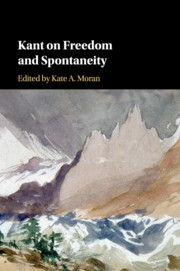Book contents
- Kant on Freedom and Spontaneity
- Kant on Freedom and Spontaneity
- Copyright page
- Dedication
- Contents
- Contributors
- Acknowledgments
- Abbreviations
- Introduction
- Part I Spontaneity: Pure Concepts of the Understanding, Imagination, and Judgment
- Chapter 1 Kant on Imagination and Object Constitution
- Chapter 2 Pure Understanding, the Categories, and Kant’s Critique of Wolff
- Chapter 3 Transcendental Idealism in the B-Deduction
- Chapter 4 Kant’s A priori Principle of Judgments of Taste
- Part II The Inner Value of the World: Freedom as the Keystone of Kant’s Moral Philosophy
- Part III Freedom as Autonomous Willing: Kant’s Sensible Agent
- Part IV Freedom on a Bounded Sphere: Kant’s Political Philosophy
- Postscript
- Bibliography
- Index
Chapter 3 - Transcendental Idealism in the B-Deduction
from Part I - Spontaneity: Pure Concepts of the Understanding, Imagination, and Judgment
Published online by Cambridge University Press: 07 September 2018
- Kant on Freedom and Spontaneity
- Kant on Freedom and Spontaneity
- Copyright page
- Dedication
- Contents
- Contributors
- Acknowledgments
- Abbreviations
- Introduction
- Part I Spontaneity: Pure Concepts of the Understanding, Imagination, and Judgment
- Chapter 1 Kant on Imagination and Object Constitution
- Chapter 2 Pure Understanding, the Categories, and Kant’s Critique of Wolff
- Chapter 3 Transcendental Idealism in the B-Deduction
- Chapter 4 Kant’s A priori Principle of Judgments of Taste
- Part II The Inner Value of the World: Freedom as the Keystone of Kant’s Moral Philosophy
- Part III Freedom as Autonomous Willing: Kant’s Sensible Agent
- Part IV Freedom on a Bounded Sphere: Kant’s Political Philosophy
- Postscript
- Bibliography
- Index
Summary
- Type
- Chapter
- Information
- Kant on Freedom and Spontaneity , pp. 48 - 65Publisher: Cambridge University PressPrint publication year: 2018
- 1
- Cited by



